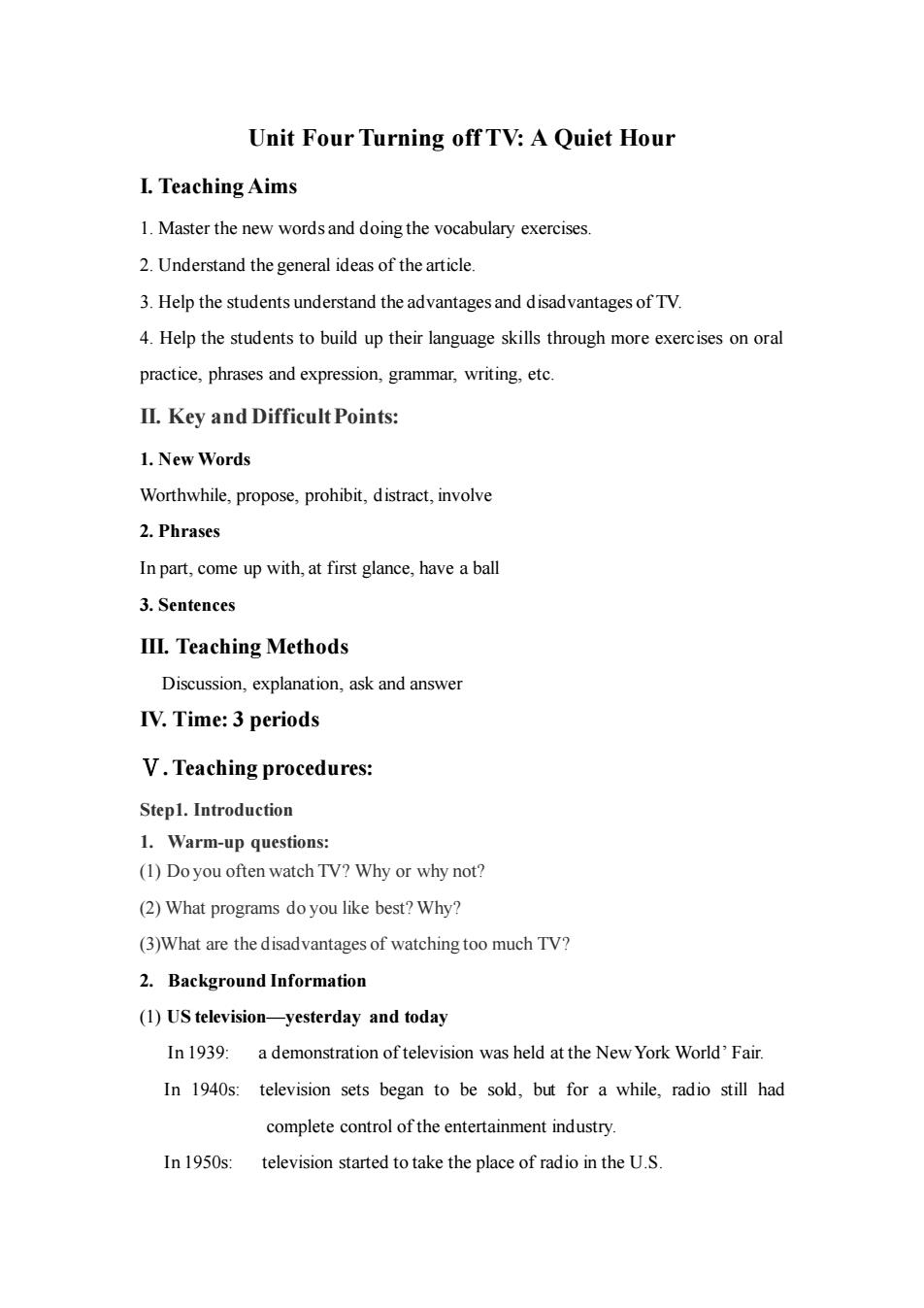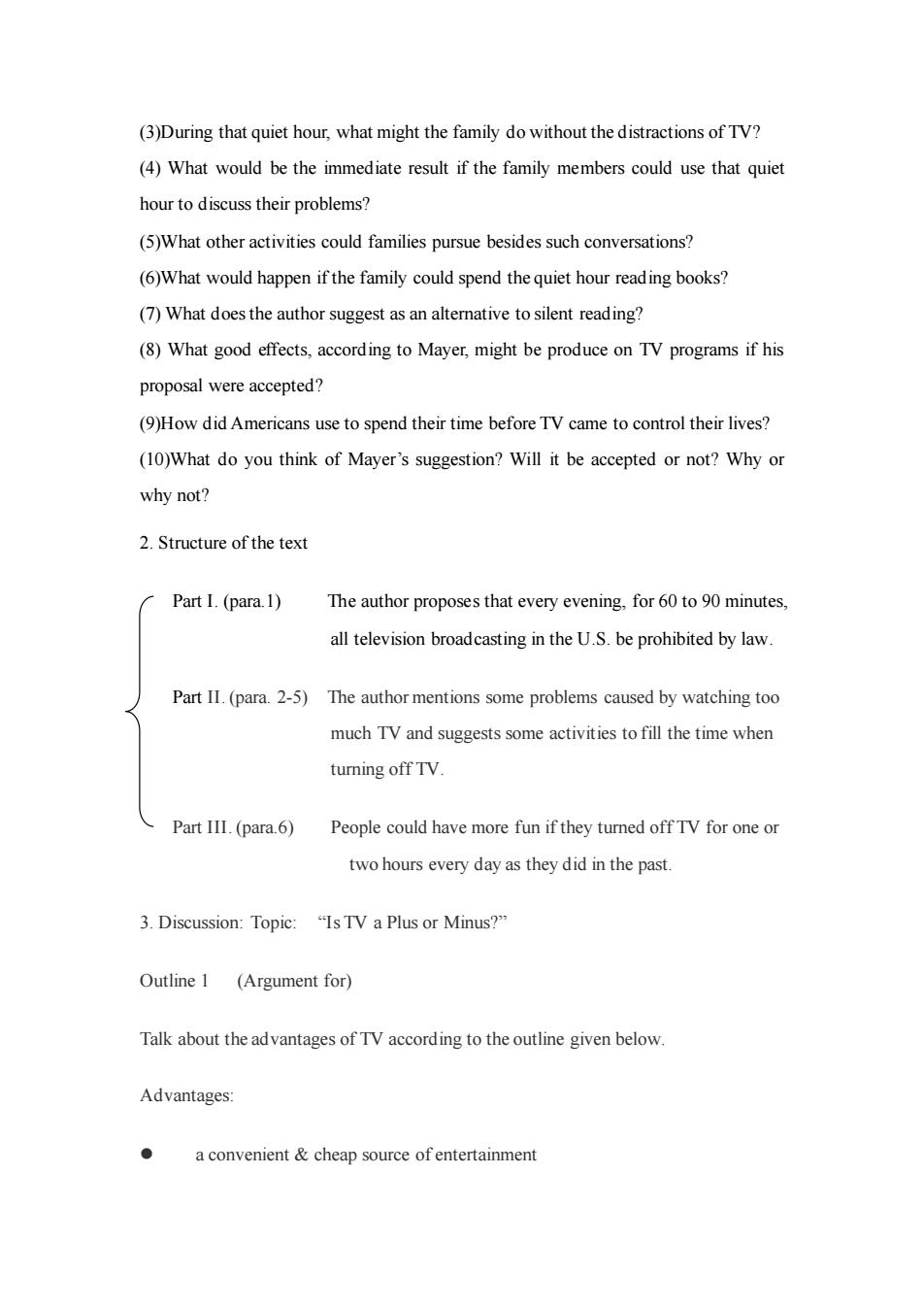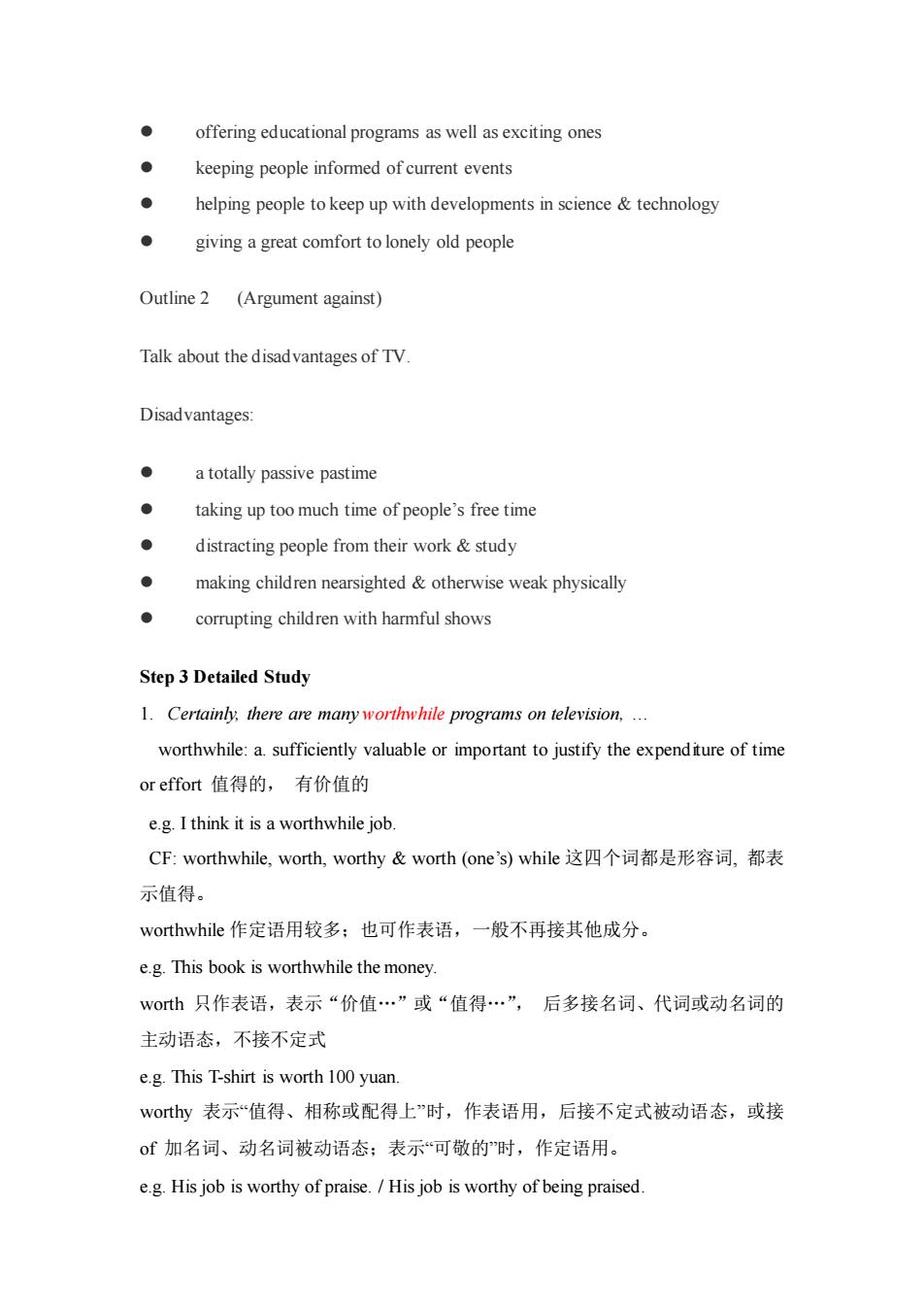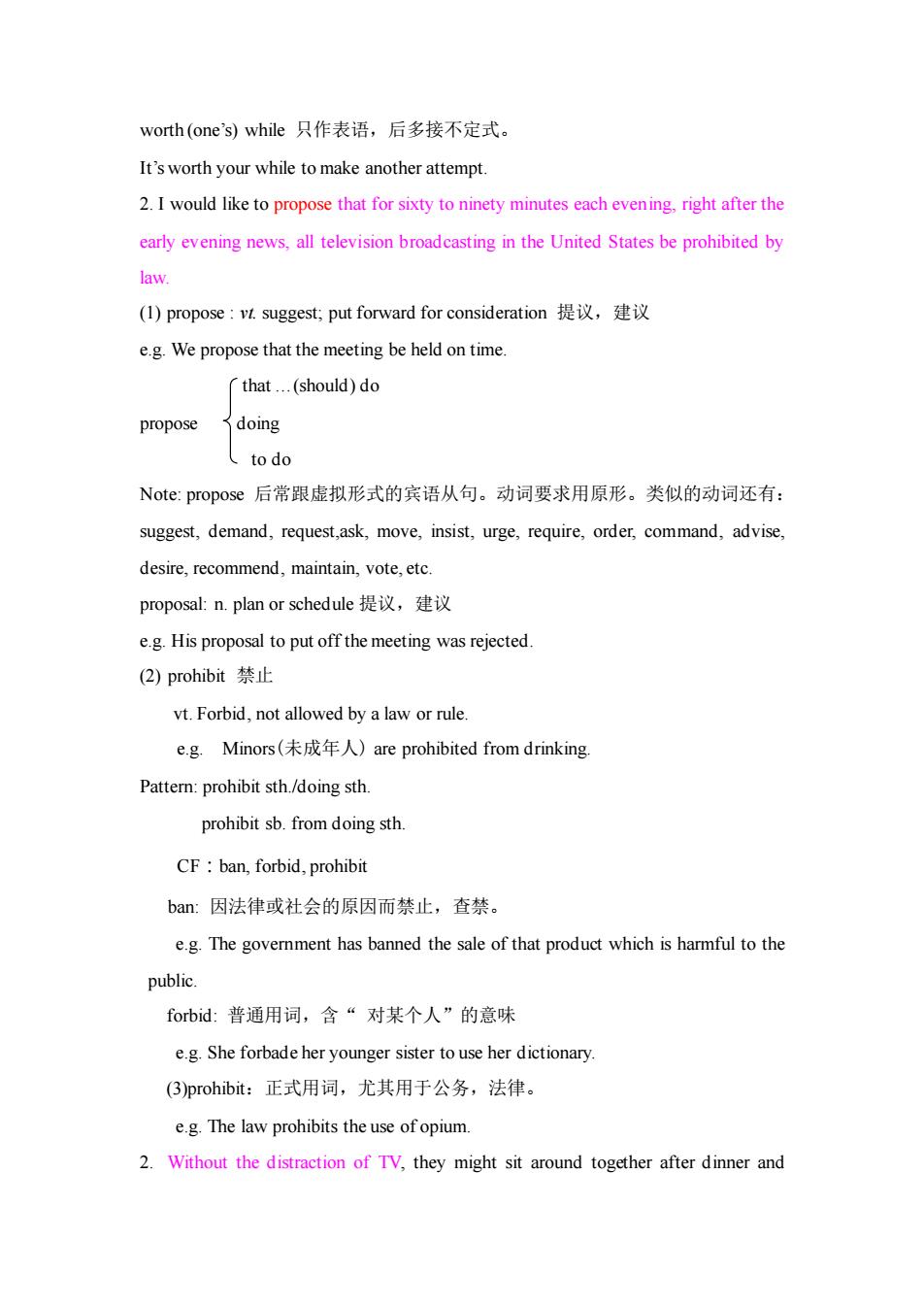
Unit Four Turning off TV:A Quiet Hour I.Teaching Aims 1.Master the new words and doing the vocabulary exercises 2.Understand the general ideas of the article. 3.Help the students understand the advantages and disadvantages of TV. 4.Help the students to build up their language skills through more exercises on oral practice,phrases and expression,grammar,writing,etc II.Key and Difficult Points 1.New Words Worthwhile,propose.prohibit,distract,involve 2.Phrases In part,come up with,at first glance,have a ball 3.Sentences III.Teaching Methods Discussion,explanation,ask and answer IV.Time:3 periods V.Teaching procedures: Stepl.Introduction 1.Warm-up questions: (1)Doyou often watch TV?Why or why not? (2)What programs do you like best?Why? (3)What are the disadvantages of watching too much TV? 2.Background Information (1)US television-yesterday and today In 1939:a demonstration oftelevision was held at the New York World'Fair. In 1940s:television sets began to be sol,but for a while,radio still had completecontrol of the entertainment industry. In1950s: television started to take the place of radio in the U.S
Unit Four Turning off TV: A Quiet Hour I. Teaching Aims 1. Master the new words and doing the vocabulary exercises. 2. Understand the general ideas of the article. 3. Help the students understand the advantages and disadvantages of TV. 4. Help the students to build up their language skills through more exercises on oral practice, phrases and expression, grammar, writing, etc. II. Key and Difficult Points: 1. New Words Worthwhile, propose, prohibit, distract, involve 2. Phrases In part, come up with, at first glance, have a ball 3. Sentences III. Teaching Methods Discussion, explanation, ask and answer IV. Time: 3 periods Ⅴ. Teaching procedures: Step1. Introduction 1. Warm-up questions: (1) Do you often watch TV? Why or why not? (2) What programs do you like best? Why? (3)What are the disadvantages of watching too much TV? 2. Background Information (1) US television—yesterday and today In 1939: a demonstration of television was held at the New York World’ Fair. In 1940s: television sets began to be sold, but for a while, radio still had complete control of the entertainment industry. In 1950s: television started to take the place of radio in the U.S

In 1960s:American TV audience included almost every family Today: there are a thousand stations all over the country. (2)Generation Gap The term is used to mean differences in ideas,life styles and attitudes between older and younger people,differences which will be result in a lack of understanding between them and frequently lead to confrontations. (3)Divorce Rate High divorce rate is a major social problem in the US.At present,it is estimated, about one quarter to one third of all American marriages end in divorce.Although different in opinions,some studies indicate that there are more cases with the following reasons A)low incomes B)inadequate education C)marriage at a very young age The immediate result that arises from the high divorce rate is an increasing number of single parent homes. 3.Introductory Remarks Television,since its first prevalence over radio in the 1950s,has played a more and more important role in people's lives.As a matter of fact,it has become so much a part of human life that a modern world without television is not worth living.But some,on the other hand,argue against TV.They think TV is taking up too much of a person's time and making him lazy,not to mention its harmful influence upon him, The author of this article,for example,is raising his voice against TV,urging viewers totu off their sets and enjoy a precious quiet hour,an hour without the distraction ofTV. Step2.Global Reading 1.Questions about the text (1)Some worthwhile programs are mentioned in the Editor's Note.What are they? Can you cite some of them? (2)What does Mayer suggest in his article?
In 1960s: American TV audience included almost every family. Today: there are a thousand stations all over the country. (2) Generation Gap The term is used to mean differences in ideas, life styles and attitudes between older and younger people, differences which will be result in a lack of understanding between them and frequently lead to confrontations. (3) Divorce Rate High divorce rate is a major social problem in the US. At present, it is estimated, about one quarter to one third of all American marriages end in divorce. Although different in opinions, some studies indicate that there are more cases with the following reasons: A) low incomes B) inadequate education C) marriage at a very young age The immediate result that arises from the high divorce rate is an increasing number of single parent homes. 3. Introductory Remarks Television, since its first prevalence over radio in the 1950s, has played a more and more important role in people’s lives. As a matter of fact, it has become so much a part of human life that a modern world without television is not worth living. But some, on the other hand, argue against TV. They think TV is taking up too much of a person’s time and making him lazy, not to mention its harmful influence upon him, The author of this article, for example, is raising his voice against TV, urging viewers to turn off their sets and enjoy a precious quiet hour, an hour without the distraction of TV. Step2. Global Reading 1. Questions about the text (1) Some worthwhile programs are mentioned in the Editor’s Note. What are they? Can you cite some of them? (2)What does Mayer suggest in his article?

(3)During that quiet hour,what might the family do without the distractions of TV? (4)What would be the immediate result if the family members could use that quiet hour to discuss their problems? (5)What other activities could families pursue besides such conversations? (6)What would happen if the family could spend the quiet hour reading books? (7)What does the author suggest as an altemative to silent reading? (8)What good effects,according to Mayer,might be produce on TV programs if his proposal were accepted? (9)How did Americans use to spend their time before TV came to control their lives? (10)What do you think of Mayer's suggestion?Will it be accepted or not?Why or why not? 2.Structure of the text Part I.(para.1) The author proposes that every evening.for 60 to90 minutes, all television broadcasting in the U.S.be prohibited by law Part II.(para.2-5)The author mentions some problems caused by watching too much TV and suggests some activities to fill the time when turning off TV. Part III.(para6) People could have more fun if they turned off TV for one or two hours every day as they did in the past. 3.Discussion:Topic:"Is TV a Plus or Minus?" Outline 1 (Argument for) Talk about the advantages of TV according to the outline given below Advantages: ● a convenient cheap source of entertainment
(3)During that quiet hour, what might the family do without the distractions of TV? (4) What would be the immediate result if the family members could use that quiet hour to discuss their problems? (5)What other activities could families pursue besides such conversations? (6)What would happen if the family could spend the quiet hour reading books? (7) What does the author suggest as an alternative to silent reading? (8) What good effects, according to Mayer, might be produce on TV programs if his proposal were accepted? (9)How did Americans use to spend their time before TV came to control their lives? (10)What do you think of Mayer’s suggestion? Will it be accepted or not? Why or why not? 2. Structure of the text Part I. (para.1) The author proposes that every evening, for 60 to 90 minutes, all television broadcasting in the U.S. be prohibited by law. Part II. (para. 2-5) The author mentions some problems caused by watching too much TV and suggests some activities to fill the time when turning off TV. Part III. (para.6) People could have more fun if they turned off TV for one or two hours every day as they did in the past. 3. Discussion: Topic: “Is TV a Plus or Minus?” Outline 1 (Argument for) Talk about the advantages of TV according to the outline given below. Advantages: ⚫ a convenient & cheap source of entertainment

offering educational programs as well as exciting ones keeping people informed of current events helping people to keep up with developments in science&technology ● giving a great comfort to lonely old people Outline 2 (Argument against) Talk about the disadvantages of TV. Disadvantages ● a totally passive pastime taking up too much time of people's free time ● distracting people from their work&study ● making children nearsighted&otherwise weak physically ● corrupting children with harmful shows Step 3 Detailed Study 1.Certainly.there are many worthwhile programs on television. worthwhile:a.sufficiently valuable or important to justify the expenditure of time or effort值得的,有价值的 e.g.I think it is a worthwhile job CF:worthwhile,.worth,worthy&worth(one's)while这四个词都是形容词,都表 示值得。 worthwhile作定语用较多:也可作表语,一般不再接其他成分。 e.g.This book is worthwhile the money woth只作表语,表示“价值…”或“值得…”,后多接名词、代词或动名词的 主动语态,不接不定式 e.g.This T-shirt is worth 100 yuan. worthy表示“值得、相称或配得上”时,作表语用,后接不定式被动语态,或接 0f加名词、动名词被动语态:表示“可敏的时,作定语用。 e.g.His job is worthy of praise./His job is worthy of being praised
⚫ offering educational programs as well as exciting ones ⚫ keeping people informed of current events ⚫ helping people to keep up with developments in science & technology ⚫ giving a great comfort to lonely old people Outline 2 (Argument against) Talk about the disadvantages of TV. Disadvantages: ⚫ a totally passive pastime ⚫ taking up too much time of people’s free time ⚫ distracting people from their work & study ⚫ making children nearsighted & otherwise weak physically ⚫ corrupting children with harmful shows Step 3 Detailed Study 1. Certainly, there are many worthwhile programs on television, … worthwhile: a. sufficiently valuable or important to justify the expenditure of time or effort 值得的, 有价值的 e.g. I think it is a worthwhile job. CF: worthwhile, worth, worthy & worth (one’s) while 这四个词都是形容词, 都表 示值得。 worthwhile 作定语用较多;也可作表语,一般不再接其他成分。 e.g. This book is worthwhile the money. worth 只作表语,表示“价值…”或“值得…”, 后多接名词、代词或动名词的 主动语态,不接不定式 e.g. This T-shirt is worth 100 yuan. worthy 表示“值得、相称或配得上”时,作表语用,后接不定式被动语态,或接 of 加名词、动名词被动语态;表示“可敬的”时,作定语用。 e.g. His job is worthy of praise. / His job is worthy of being praised

worth(ones)while只作表语,后多接不定式 It's worth your while to make another attempt. 2.I would like to propose that for sixty to ninety minutes each evening,right after the early evening news,all television broadcasting in the United States be prohibited by law. (I)propose:v1.suggest;,put forward for consideration提议,建议 e.g.We propose that the meeting be held on time (that.(should)do propose doing to do Note:propose后常跟虚拟形式的宾语从句。动词要求用原形。类似的动词还有: suggest,demand,request,ask,move,insist,urge,require,order,command,advise, desire,recommend,maintain,vote,etc. proposal:n.plan or schedule提议,建议 e.g.His proposal to put off the meeting was rejected (2)prohibit禁止 vt.Forbid,not allowed by a law or rule. e,Minors(未成年人)are prohibited from drinking Pattern:prohibit sth./doing sth. prohibit sb.from doing sth. CF:ban,forbid,prohibit ban:因法律或社会的原因而禁止,查禁 e.g.The govemnment has banned the sale of that product which is harmful to the public. forbid:普通用词,含“对某个人”的意味 e.g.She forbade her younger sister to use her dictionary. (3)prohibit:正式用词,尤其用于公务,法律。 e.g.The law prohibits the use of opium 2.Without the distraction of TV,they might sit around together after dinner and
worth (one’s) while 只作表语,后多接不定式。 It’s worth your while to make another attempt. 2. I would like to propose that for sixty to ninety minutes each evening, right after the early evening news, all television broadcasting in the United States be prohibited by law. (1) propose : vt. suggest; put forward for consideration 提议,建议 e.g. We propose that the meeting be held on time. that …(should) do propose doing to do Note: propose 后常跟虚拟形式的宾语从句。动词要求用原形。类似的动词还有: suggest, demand, request,ask, move, insist, urge, require, order, command, advise, desire, recommend, maintain, vote, etc. proposal: n. plan or schedule 提议,建议 e.g. His proposal to put off the meeting was rejected. (2) prohibit 禁止 vt. Forbid, not allowed by a law or rule. e.g. Minors(未成年人) are prohibited from drinking. Pattern: prohibit sth./doing sth. prohibit sb. from doing sth. CF:ban, forbid, prohibit ban: 因法律或社会的原因而禁止,查禁。 e.g. The government has banned the sale of that product which is harmful to the public. forbid: 普通用词,含“ 对某个人”的意味 e.g. She forbade her younger sister to use her dictionary. (3)prohibit:正式用词,尤其用于公务,法律。 e.g. The law prohibits the use of opium. 2. Without the distraction of TV, they might sit around together after dinner and